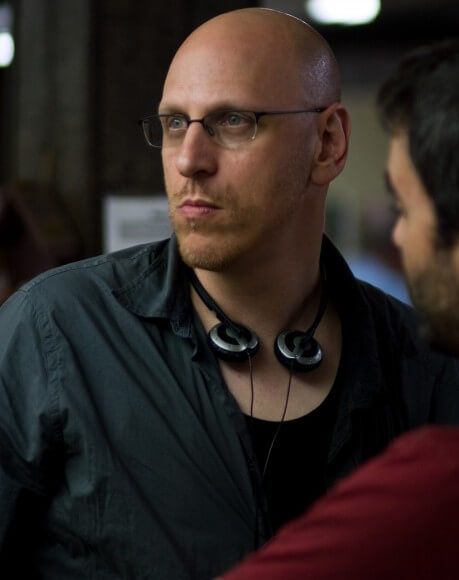On Fresh Air yesterday Terry Gross interviewed Oren Moverman, the screenwriter of Love and Mercy, the new movie about Brian Wilson, the troubled and brilliant member of the Beach Boys. Moverman lives in New York, and he left Israel for political reasons. Gross didn’t really want to hear Moverman’s political thoughts, though.
GROSS: You grew up in Israel in…
MOVERMAN: Guilty.
GROSS: (Laughter) In a house of women – am I right about that?
MOVERMAN: Yeah. I mean, no, my father was around, but he was a very hard worker and wasn’t that much around.
GROSS: OK. So then you went into the military – drafted?
MOVERMAN: Yeah, like everybody else – in Israel.
GROSS: And you said that you weren’t used to the kind of macho culture of the military. How was the military a turning point for you in your life?
MOVERMAN: It’s a big turning point in my life because it made me realize that I didn’t want to live in Israel. I was part of the Israeli occupation of Lebanon and Israeli occupation of Palestine and spent a lot of time in these territories and just felt, at the end of it, that I was really done with my life in Israel and that I wanted to move to the States to, A, pursue a dream, which has sort of become a reality, and then also to make a life for myself in a different place.
GROSS: But it sounds like you went through personal things in the military beyond, you know, political and ethical issues.
MOVERMAN: Yeah. Well, I think…
GROSS: You know, just like being a man in the culture of the military.
MOVERMAN: Yeah. I mean, the culture of the military is really the culture of Israel because it’s a people’s army. Everybody serves, or most everyone serves. I struggled ultimately with the fact that for me, it was an act. I mean, I didn’t have a problem fitting in as a soldier and then being a good soldier. But I was ultimately looking at a population that we were occupying. I was looking at a – certain policies – this is the late ’80s into the first intifada when I was in Gaza – that just didn’t feel for me, selfishly, like something that I wanted to be a part of.
Gross is a very psychological interviewer, I get that, OK; but in this case she flicked off Moverman’s explicitly political statement to ask him about “being a man in the culture of the military.” She allowed a generic critique of the military to keep her audience from hearing about a political issue. Moverman wasn’t bridling at the “macho culture of the military” because he’d grown up in a family of women. He was bridling at the occupation of Arab lands, in Lebanon and Palestine.
Tell us about Palestine, Oren. When you said “Guilty” at the start, Oren, it didn’t sound like a joke. Do you believe in a Jewish state? What does your life in the U.S. tell you about Israel? Nope, didn’t happen.
And yes there’s a political agenda here. Gross hosted Max Blumenthal to talk about his Republicans book, but not his Israel-slam. She gloried Ari Shavit’s reconstituted hard-core Zionism. She held up Alan Dershowitz as a model when attacking Jimmy Carter for saying that Israel practices apartheid.
There was more. When Moverman moved to the States to find his fortune, he had a card in his pocket from a guy he’d met in occupied Palestine. But let him tell the story.
MOVERMAN: I was very lucky to have met a guy when I was in the occupied territories as a soldier, a wonderful man by the name of Ron Yoshida, who was a sound man in New York. And when I met him, it was under a difficult circumstance. And I was telling him to stop shooting video in Hebron, and he got very upset. And we got into a conversation, and I told him that politically, I don’t agree with what I’m doing. So he calmed down, and we had a nice chat. He gave me his business card, and I held onto it for four years until I was done with my service. And then I decided to come to New York, go to school. I wrote to him, and I said, I’m coming. I don’t know if you remember me, but I’d love to meet. And so we did, and he helped me out. He got me some jobs as a production assistant, first for Albert Maysles’ company and then on a couple of features where I met other people. And from there on, it’s all, you know, the kindness of strangers.
GROSS: What kind of film – what kind of video was he shooting that you wanted him to stop?
MOVERMAN: He was shooting just the place, sort of documentary footage that he was just shooting for himself. And we were on patrol in Hebron. And my sergeant told me, you know, you speak English. Go over there, tell that guy to stop. So I went over, and I said, you have to stop shooting. And he got very upset and said, I don’t understand. I was shooting everywhere else. And I started laughing and I said, I totally agree with you, but that idiot sergeant of mine told me to tell you to stop. But I would gladly help you shoot this stuff. It’s just that I can’t. And so he, you know, relaxed, and we had a really interesting conversation about the Middle East. But he was really sent to me (laughter) you know, as my – the only person I knew in New York and the only person I knew connected to the film business.
Moverman was describing two of the central experiences of activists in the occupied territories: 1, they go to Hebron first, as I did on my first trip in 2006, to see apartheid before their eyes, streets that Palestinians live on that they are not allowed to walk on because of the Jewish settlers who have taken over their city; 2, the activists are often stopped by soldiers who tell them that they are in a Closed Military Zone.
These conditions are why Moverman fled the country, why the former chancellor of Brown University said he had witnessed “apartheid on steroids,” why an Israeli writer says that the Palestinians’ lot amounts to slavery, why I wrote that Gaza reminded me of the pictures my mother had given me of the Warsaw Ghetto. We have to hope that Terry Gross, my father’s favorite journalist, expresses greater curiosity about these monstrous conditions in days to come.



Excellent post, Phil. I think you probably mean Ron Yoshida, who is listed in IMDB as a film sound editor who has worked with Moverman. Moverman gave an interview in 2008 in which he refers to the individual by that name.
Poor Oedipus, he was subjected to a “first-class tragic trauma”.
I think NPR should change the program name to “Stale Air”.
Fresh thinking or ideas are hardly part of NPR,s mantra when dealing with the subject of I/P.
Thanks for the report Phil.It is good to see the vents at NPR being slightly opened and it may be a small start to getting that stuffy place aired out properly.
Terry Gross is no journalist. And I do not know what it means that she is psychological. She does have a tendency to try a draw out some sappy story from her guests. (Something many find annoying.)
I heard that interview and she had a fascinating guest, but succeeded in keeping the interview as light, mundane and meaningless as possible. And cut him off a various points.
She likes to invite Israelis, but succeeds in making all her guests and trivial as her show.
Mr Weiss’ optimism about inveterate Zionists sure beats Pollyanna’s.
That will get me censored again, I suppose.